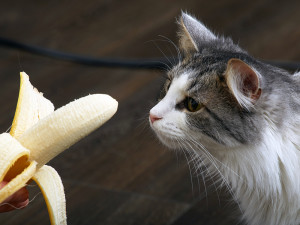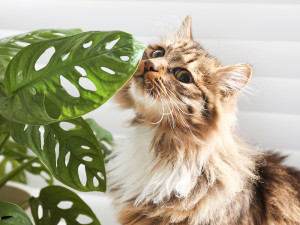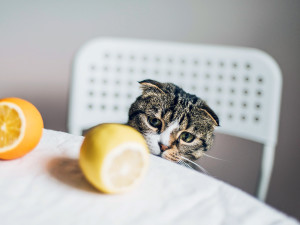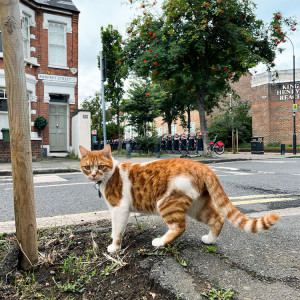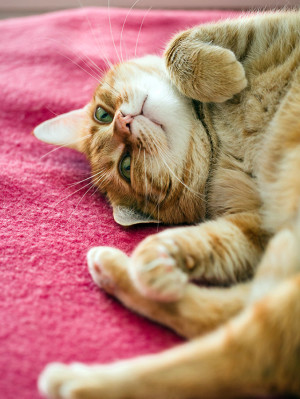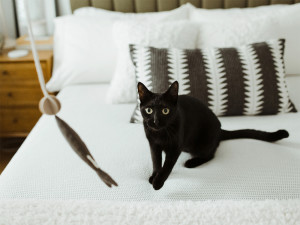7 Scents Your Cat Probably Can’t Stand – Plus, a Few They Love
Their noses are as powerful as they are cute
Cat noses, aside from being unbelievably adorable, are pretty impressive. A cat’s sense of smell opens in a new tab is 14 times more powerful than a human’sopens in a new tab. Imagine your favourite scent amplified by 14 – then imagine your least favourite scent amplified by 14. Needless to say, the odours in a cat’s environment can make a big difference to their mood.
“Cats have an incredibly developed sense of smell, and certain scents can provoke strong reactions, whether of attraction or aversion,” says veterinarian Dr Sabrina Kong.
littleKin™ is Kinship’s home just for puppy and kitten parents. Bop over to check out expert advice, new pet tools, and special deals—all curated for your newest family member.
opens in a new tabMost of us would do anything to get on our cat’s good side, which might start with knowing which smells irritate them. The next time you’re picking out a candle (wickless, preferably – safety first), keep this guide in mind.
Scents cats think are gross
All cats are different, but there are some scents that cats generally shy away from.
Citrus
Most famously, cats tend to turn their nose up at those fresh fruity scents humans love. “Among the scents most cats dislike are citrus odours like lemon, lime and orange,” says Dr Kong. So, if your cat’s giving you the cold shoulder, it might be time to swap out your orange blossom hand soap for something a little more palatable.
Banana
You may have seen this on TikTokopens in a new tab, but a lot of cats don’t want to be anywhere near a banana (and some cats opens in a new tab). This may be because banana peels contain ethyl acetateopens in a new tab, which smells a little like acetone – ie, the stuff in nail polish remover – which isn’t a nice smell to a cat’s super-powerful nose. Funny enough, bananas aren’t toxic to cats… so if they can get past the scent, feel free to give them a small piece.
Essential oils
“Strong aromatic oils such as eucalyptus, lavender, peppermint and cinnamon are generally unappealing to cats,” says Dr Kong. But even more importantly, they’re toxic to cats, so keep your diffuser far away from your pet. Essential oils can cause kitties to experience vomitingopens in a new tab, trouble breathing, and even liver failure.
Spices
Some cats dislike the smell of spices like cayenne and chilli powder, which contain capsaicin, a chemical that is very harmful to cats. Never give your cat access to capsaicin; if the spice gets on their skin, it can be very painful and irritating.
Coffee
Some anecdotal evidence shows that cats dislike the strong smell of coffee grounds – but take this one with a grain of salt, because there’s also some anecdotal evidence that some cats (OK, my cat) will stick their face into your coffee cup when you aren’t looking.
Vinegar
Most humans don’t like the smell of vinegar, so it makes sense that cats – with their super-strong sense of smell – hate it even more.
Strong artificial smells
In general, cats prefer keeping it natural. “Perfumes can be aversive to cats, heavily scented hair and skin products, Glade plug-ins, burning incense, heavily scented candles – those can all be unpleasant to cats because they’re artificial,” Dr Mikel Delgado recently told Kinship.
Scents cats go wild for
On the other hand, there are a few scents cats adore. Most obviously: catnipopens in a new tab. “Cats are famously attracted to the scent of catnip, which contains nepetalactone,” says Dr Kong says. Cats also love the smell of fish and pheromone spraysopens in a new tab.
“Valerian root is another scent many cats find irresistible, likely due to its isovaleric acid content,” adds Dr Kong. “These scents can be used in toys or bedding to encourage cats to favor certain spots or items.”
A few caveats
Although some people attest to using non-toxic scents, such as citrus, to deter their cat from approaching certain surfaces, Dr Delgado’s not sure how well this works. “People have suggested it as a deterrent, like to keep cats out of your garden, but I have not seen it be that effective. But it is possible,” she said. “I don’t think if you eat tangerines your cat is going to run away from home. But you probably don’t want to put citrus odours on their bedding.”
She also cautioned that it’s not the most effective way to change a cat’s behaviour. “I don’t use those methods of training,” she said. “Whenever you’re trying to change a behaviour, it really depends on what the motivation for the behaviour is. So, you need to address the underlying reason for the behaviour.”
If you’re going to use scents to keep a cat away, be sure to do it safely. “Essential oils and other strong scents should be used sparingly and never applied directly to the cat or within their reach, as ingestion or direct contact can be harmful,” says Dr Kong. “Instead, scent deterrents can be applied to cotton balls or diffused in areas you wish to keep cat-free.”


